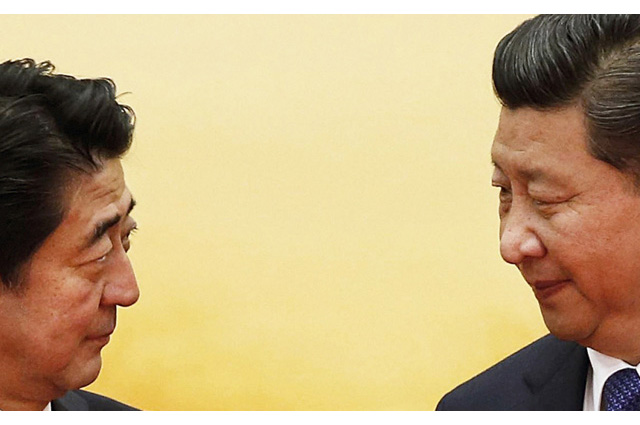After more than two years of rising tensions, Japanese Prime Minister Shinzo Abe and Chinese President Xi Jinping finally faced one another at Beijing’s APEC summit on November 10. But instead of a confrontation, the longtime rivals shocked onlookers by shaking hands.
“This is a first step toward improving ties between Japan and China and returning to the starting point of a mutually beneficial relationship based on common strategic interests,” Prime Minister Abe said at a press conference after the meeting, as reported by Bloomberg.
Some pundits had given up hope on such a thawing, no matter how meagre, of the nations’ icy relations. After all, both sides have risked numerous sea skirmishes with tit for tat patrols of disputed neighboring islands. That row was heightened by Abe’s 2013 trip to Yasukuni Jinja, a controversial shrine and war memorial that includes the remains of Japanese soldiers who fiercely occupied China during WWII.
Reporters noted that those previous rows made for an “awkward” handshake between Xi and Abe on Monday, before adding that it was followed by a more positive meeting that marked the first formal talks “since the two leaders took office, a breakthrough in efforts to improve ties between the Asian rivals.”
But experts insisted that the meeting was not a reconciliation by any means. Both sides agreed that the talks would open “the door to lower-level dialogue, including stalled high-level economic discussions.” But no solution to the island row was tabled, much less agreed upon. On top of that, reports highlighted that Xi was not only “stiff” and “unsmiling” during the talks, but also tardy for the photo op with Abe, “a departure from usual protocol in which the Chinese leader is on hand waiting for a guest.”
An editorial in The China Daily (long considered to be a mouthpiece of the PRC) said the meeting was “by and large symbolic. Neither Xi nor Abe said much that had not been heard before: Abe repeating his claim that his government is fully committed to restoring mutually beneficial ties with China; Xi urging Japan to stay true to its words of peace and good-neighborliness.”
Meanwhile, the Bloomberg article notes that the US, Japan’s longtime military ally, has taken issue with what they see as China’s aggressive pursuit of “maritime claims.” That story went on to say that, during his previous term, Abe was instrumental in mending fissures between China and Japan, before conceding that: “…since taking office again in 2012, his efforts to ease the limits of Japan’s pacifist constitution and recast wartime history with a less apologetic tone and China’s greater regional assertiveness have deepened friction.”
Other experts suggest that Abe initiated the meeting because of China’s economic surpassing of Japan. But Da Zhigang, head of the Institute of North Asian studies, noted Xi may have also been saving face at APEC, albeit for different reasons, adding: “The Chinese authorities appear to have been reluctant or unwilling to meet the Japanese side, to appease domestic nationalist sentiment that has risen in past years… But in fact the meeting conforms to the interests of both sides.”
—Kyle Mullin
Image: SCMP









